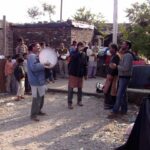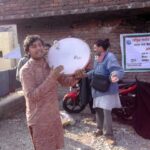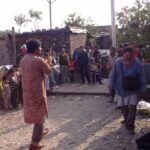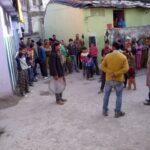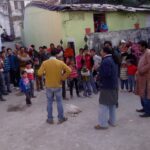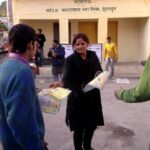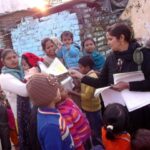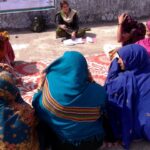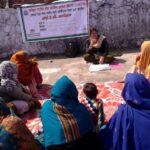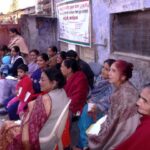INTEGRATED SOLID WASTE MANAGEMENT PROJECT FOR IEC
INTEGRATED SOLID WASTE MANAGEMENT PROJECT FOR INFORMATION, EDUCATION & COMMUNICATION (IEC) AND FACILITATION FOR SOLID WASTE MANAGEMENT OF DEHRADUN NAGAR NIGAM UNDER JNNURM PROJECT
INTRODUCTION AND BACKGROUND OF THE PROJECT
The efficient and systematic handling of solid waste emerges as a pivotal service within urban domains, demanding both proactive attention and paramount administrative emphasis. The ramifications of improper solid waste management reverberate through the environment and public health, with the marginalized strata of society often bearing the brunt of its repercussions. As urban centers burgeon with swelling populations, the urgency of devising sound waste management frameworks intensifies, amplifying the need for strategic interventions. Multiple factors converge to challenge cities in maintaining a state of cleanliness and optimal waste management protocols. Principal among these are resource constraints, both in terms of finances and personnel, which routinely hinder progress. Concurrently, institutional frailties and subpar technology further impede the efficacy of waste management endeavours.
Moreover, a general lack of public engagement in cleanliness initiatives can exacerbate the accumulation of waste and exacerbate the situation. The imperative to confront these challenges head-on is undeniable. The establishment of robust waste management strategies stands as a critical bulwark against the adverse outcomes of indiscriminate waste disposal. Such strategies are imperative to mitigate the environmental fallout and to uphold the health and wellbeing of residents. In summation, grappling with the multifaceted challenges linked to solid waste management is not merely a choice, but an indispensable facet of urban governance. Through the strategic implementation of effective waste management protocols, cities can navigate the labyrinth of waste-related complexities, thus ameliorating the environmental and public health impact of improper disposal practices.
AIMS AND OBJECTIVES OF THE PROJECT
1. Enhance the efficiency of solid waste management and uphold cleanliness standards within the city through a multifaceted approach.
2. Augment public awareness surrounding the significance of cleanliness and the adoption of effective waste management practices.
3. Initiate a comprehensive public campaign that engages a diverse range of stakeholders, including NCC, NSS, schoolchildren, government personnel, local representatives, Residents’ Welfare Associations (RWAs), and residents themselves.
4. Empower citizens with knowledge pertaining to proper solid waste management techniques and the importance of maintaining cleanliness.
5. Execute a citywide clean up initiative, harnessing the existing human resources to ensure the proficient management of waste materials.
6. Optimize waste collection and disposal systems, thereby establishing a secure and streamlined waste management infrastructure.
7. Cultivate an environment that is both cleaner and healthier, thereby elevating the overall quality of life experienced by the city’s residents.
8. Promote a collaborative synergy among government agencies, civil society entities, and the citizens at large to achieve the overarching goal of improved waste management and sanitation.
9. Aspire to set an exemplary standard for proper waste management and cleanliness, ultimately serving as an inspiration for other urban areas to follow suit.
COMPONENTS AND ACTIVITIES OF THE PROJECT
1. Elevate the standards of solid waste management and cleanliness within the city through a strategic implementation of project components.
2. Execute a robust Information, Education, and Communication (IEC) initiative to foster awareness and understanding of Integrated Solid Waste Management principles.
3. Administer targeted IEC campaigns within five designated wards of Nagar Nigam, Dehradun, led by the implementing agency, HIFEED.
4. Disseminate essential knowledge among citizens regarding effective waste management techniques, encompassing the segregation, recycling, and composting of waste materials.
5. Highlight the paramount importance of waste reduction strategies and the promotion of sustainable consumption patterns through comprehensive IEC efforts.
TARGET AREA OF THE PROJECT
The project is confined to a specific target area consisting of five wards within Nagar Nigam, Dehradun. These wards have been delineated as the primary focal point of the project, and they represent the primary beneficiaries of the initiative.
TARGET GROUPS AND BENEFICIARIES OF THE PROJECT
The primary recipients of project benefits were the Resident Welfare Associations (RWA) located within the five designated wards of Nagar Nigam, Dehradun, which were included in the IEC program.
FUNDING PARTNER OF THE PROJECT
The project was financially supported by Nagar Nigam, Dehradun, Uttarakhand.
SANCTIONED BUDGET OF THE PROJECT
Nagar Nigam sanctioned the project in the year 2011, under sanction order No. 237 dated 17.08.2011. The total budget sanctioned by Nagar Nigam for the project’s implementation over six months was Rs. 2,35,000.00.
OUTCOMES AND ACHIEVEMENTS OF THE PROJECT
The following outcomes and achievements have been accomplished after the successful implementation of the IEC program:
1. IEC activities related to Integrated Solid Waste Management have been conducted in five wards of Nagar Nigam, Dehradun, resulting in the education of citizens about proper waste management practices, including waste segregation, recycling, and composting.
2. A public campaign involving various stakeholders, such as NCC, NSS, school children, government employees, local elected representatives, and many others, has been launched to educate citizens about the importance of cleanliness and proper waste management practices.
3. The public campaign has resulted in raising awareness among the public about cleanliness and proper waste management practices.
4. The IEC activities have emphasized the importance of reducing waste generation and promoting sustainable consumption patterns.
5. Overall, the successful implementation of the project has led to improved solid waste management and cleanliness in the city, resulting in a cleaner and healthier environment for citizens. The project’s objectives have been achieved through a collaborative effort from all stakeholders, including government agencies, civil society organizations, and citizens.








